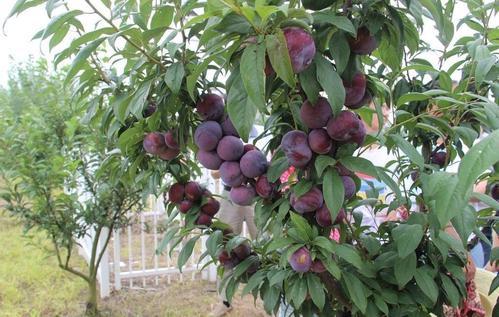Welcome to Jiangxi New Reyphon Biochemical Co., Ltd!
Service Hotline:0796-2676038 中文版 · ENGLISH
Do you know how to use S-attractant? Under what circumstances is it used? What is the effect?
Release time:
2020-05-30
S-inducer is a plant hormone, also known as abscisic acid, because the initial thought can promote plant leaf abscission and named, it has a role in multiple stages of plant development, in addition to promote leaf abscission, there are other effects, such as inhibiting growth, promoting dormancy, promoting the formation of potato tubers and plant resistance.
S-inducer is suitable for what situation
S-inducer is widely present in plants, and together with gibberellin, auxin, cytokinin and ethylene constitute five major plant endogenous hormones. It can be widely used in crops such as rice, vegetables, flowers, lawns, cotton, Chinese herbal medicine, fruit trees, etc., to improve the growth potential, seed setting rate and quality of crops in poor growth environments such as low temperature, drought, spring cold, salinity, diseases and insect pests, and improve The yield per unit area of low-yield fields reduces the amount of chemical pesticides. Studies have shown that under drought, high salt or low temperature stress conditions, the possible mechanism is that stress conditions promote the accumulation of ABA in plants, induce the expression of ABA response element genes, and thus produce resistance to stress.
The role of S-attractin
① S-inducer and drought stress: Drought is one of the common natural disasters in agricultural production, and its harm to agricultural production is serious, which is the bottleneck of agricultural development in many water shortage areas. Under sudden drought stress, the application of S-inducer can initiate cell conduction on the leaf plasma membrane, induce uneven closure of leaf stomata, reduce water transpiration loss in plants, and improve water retention capacity and drought tolerance of plants.
Do you know how to use S-attractant? Under what circumstances is it used? What is the effect?
S-induced resistance and low temperature stress: temperature is one of the main factors limiting plant growth, plays an important role in the growth and development of plants, the temperature is too low, will affect the growth of plants, lower than the biological temperature and even cause plant death. Under low temperature stress, by applying S-inducer, the cell cold resistance gene can be activated and the plant can be induced to produce cold resistance protein. Generally speaking, plant varieties with strong cold resistance have high endogenous S-inducer content.
③ S-inducer and disease stress: the occurrence of diseases and insect pests is inevitable in the growth stage of plants. Under disease stress, S-inducer induces the activation of PIN gene in plant leaf cells to produce protein enzyme inhibitors (flavonoids, quinones, etc.), which hinder the further invasion of pathogens, avoid damage or reduce the damage degree of plants.

④ S-inducer and salt stress: Under soil salt stress, S-inducer can induce the accumulation of proline, a plant osmotic adjustment substance, to maintain the stability of cell membrane structure and to improve the activity of protective enzymes. The Na content per unit dry matter weight was reduced, the carboxylase activity was improved, and the salt tolerance of the plant was enhanced.
⑤ S-inducing element and phytotoxicity and fattening stress: under phytotoxicity and fattening stress, the balance of endogenous hormones in plants is regulated, further absorption is stopped, and the adverse effects of phytotoxicity and fattening are effectively relieved. Improve anthocyanin cooperation and accumulation, promote crop coloring and early maturity.
Application function of S-inducer
The "growth balance factor" of plants promotes root strengthening and root growth, promotes the growth of capillary roots, promotes the growth of strong seedlings and increases the yield, promotes sprouting and flower protection and improves the fruit setting rate, promotes fruit coloring, early harvesting and improves quality, enhances nutrient absorption and improves fertilizer utilization rate, compound efficiency, and reduces the negative effects of common drugs such as fruit deformity, cavity and fruit cracking.
The "resistance inducing factor" of plants induces crop disease resistance and improves disease resistance; improves crop resistance to adversity (cold resistance, drought resistance, waterlogging resistance, salt-alkali resistance, etc.); alleviates and reduces crop phytotoxicity.
Green environmental protection product S-inducer is a pure natural product contained in all green plants, mainly obtained through microbial fermentation, non-toxic and non-irritating to humans and animals. It is a new type of high-efficiency, natural green plant growth active substance, and has broad application prospects.
Do you know how to use S-attractant? Under what circumstances is it used? What is the effect?
S-inducer product recommend: plant regulator (0.1%S-inducer)-pentacofu-gold trust
0.1%S-inducer is a new type of plant endogenous growth conditioner, which can significantly improve the growth quality of crops, induce and activate more than 150 kinds of genes in plants to regulate the balanced growth of modern substances and the synthesis of nutrients, enhance the ability of crops to resist drought, low temperature, salinity and waterlogging, effectively prevent the occurrence of diseases and insect pests, and relieve phytotoxicity and fertilizer, and can stabilize flowers, fruit and promote fruit expansion and coloring; this product can enhance crop photosynthesis, promote the synthesis of amino acids, vitamins and proteins, accelerate the accumulation of nutrients, to improve quality, increase yield, the effect is particularly significant.
adapted crops
Fruit trees: apple, pear, peach, grape, citrus, loquat, litchi, mango, banana, navel orange, pomegranate, kiwi fruit, apricot, cherry, plum, etc.
Melons, fruits and vegetables: watermelon, melon, strawberry, tomato, eggplant, cucumber, pepper, leek, towel gourd, zucchini, etc.
Flowers: lily, rose, tulip, cyclamen, orchid, gerbera, anthurium.
Field crops: wheat, corn, rice, millet, sorghum, soybean, etc
Economic crops: tea, cotton, potatoes, sweet potatoes, peanuts, medicinal materials, rape, etc.
This product is especially for grapes, citrus, apples, dates, cherries, strawberries, tomatoes and other colored crops have a significant red coloring effect, and can effectively improve the sugar content (sweetness) of the fruit.
Related news
Jiangxi Xinruifeng Biochemical Co., Ltd.
Address: In Salt Chemical Industry City, Xingan County, Ji'an City
Jiangxi Province
Contact number:0086-0796-2676028
RM:Chen Hongxia (Amy)
E-mail:wantyan@reyphon.com
Tel: 18172879783

No public

Douyin

Kuaishou




